A new study has laid bare the mental health challenges farmers across the UK are facing, leading researchers to call for urgent attention to mental health services in rural areas.
The study, carried out by Cranfield University, found that there were increased levels of self-reported stress, anxiety, depression and suicidal feelings among farm workers during the Coronavirus pandemic. Farmers are considered essential workers and some have been shown to have poor mental health as a result of being relatively isolated physically, socially and culturally, according to the study.
When the pandemic hit the UK, farmers were already facing substantial uncertainty around transitions away from the EU's Common Agricultural policy. And Richard Rankin, CEO of H and H Group, which owns Wooler Mart, says that is not the only uncertainty that farmers face.
"Farmers are like entrepreneurs, only they face more uncontrollables and risk, namely the weather and the way they earn their income. They never know what they're going to earn because of prices, the subsidies and the basic payment scheme has been replaced but nobody really knows how the new scheme is going to work and how that'll impact them.
"They're already getting less money, which is going to continue becoming less and less. It's a bit of a perfect storm and we already know that many farmers are isolated, so who do they turn to when they've had a bad day or something goes wrong like a tractor goes wrong or the weather's bad?"

A report in 2021 by charity the Farm Safety Foundation (Yellow Wellies) found that 92% of farmers under the age of 40 cited poor mental health as the biggest hidden problem facing farmers today, a 10% increase on 2018. The Office of National Statistics registered 102 suicides in England and Wales by people working in agricultural-related trades in 2019.
The Cranfield University study found from interviewing chaplains, charities, auction mart staff and primary healthcare, that mental health services are strained in rural communities and provide uneven coverage across the country. Some healthcare settings can be inaccessible and lack an understanding of farming.
At the same time, informal spaces of social support are being eroded due to the loss of rural community and mental health charities are struggling with funding and with the trauma of helping farmers through difficult times.
Richard believes that marts have a huge role to play in looking after farmers' mental health, but in an official capacity. He continued: "The marts are a hub where people come and share, farmers will come and have a whinge or get things off their chest.
"When Covid came and we had to shut the doors, we all carried on trading but we had to do it behind closed doors so that atmosphere and the ability for people to come to their hub just went away overnight and you can still see the effects of that now. The mart is there until it's not, some farmers will come every week even if they're not buying or selling anything so they can see their mates and have a bit of craic - sometimes it's the only socialising they do all week."
However, some farmers need more than a chat with their mates at the mart to address their mental health issues. And while it can be difficult for many to raise that, there are charities out there who can help.
Caitlin Riddell, a young farmer who has had her own mental health struggles, organised the Mind Your Head Ball at the Wooler Showfield in October to highlight the support on offer to farmers and raise money for the Farm Safety Foundation (Yellow Wellies). She said: "I was working on my own, I was working really long hours in all weathers and whatever the day brought I had to get on and go and look after livestock and you're doing a lot of work in the dark, you're on your own a lot and that really highlighted to me how serious it could be for farmers.

"There are so many pressures on people in farming and when I hit a really low point, I thought I had to get better because I couldn't keep living as I was. I sought counselling in 2019 and it was only after that I became aware of the help that was out there.
"Had I know of what help was out there before I might not have struggled for so long or sought help earlier. So by organising the ball, I just really wanted to make people aware of the help that is available."
Caitlin says that the ball was "amazing but overwhelming" and several farm workers contacted her about their mental health afterwards. She continued: "It made me feel really sad there are still so many people out there who either felt that they couldn't look for help or didn't know there was help out there for them.
The 32-year-old cites RABI and The Farming Community Network, while Richard Rankin also suggested Agri Health Matters. Caitlin added: Sometimes these are just lifelines, they're there for people to call and ask for help, it might not be counselling but you might just need an ear or someone who doesn't turn round and say "it could be worse" or man up".
Both Richard and Caitlin say that the stigmas attached to mental health are more pronounced in the farming community than "regular" office jobs, and there's much needed to be done to get to the point where those who work on farms feel they can talk openly about such issues. Caitlin finished: "I think there are a lot of roadblocks up for people even thinking of looking for help because they still feel ashamed or embarrassed to."
The academics who carried out the study are calling on policymakers to take urgent action to help rural-proof primary mental healthcare service and better support civil society organisations which widen the safety net for farmers. Research project leader David Rose, Professor of Sustainable Agricultural Systems at Cranfield University, said: "The Covid-19 pandemic exacerbated issues with farmers’ mental health that we already knew existed.
"For example, primary mental healthcare provision in parts of the UK is based on urban delivery models that do not suit rural communities. This leaves civil society organisations fighting to fill the support gap, but these organisations face their own struggles.
"This issue needs urgent attention to ensure farmers get the support they need and help civil society organisations to flourish. We want devolved governments to urgently address this and ensure support is in place for future shocks."
In terms of mental health support, the Northumberland, Cumbria, Tyne and Wear NHS Foundation Trust (CNTW) has crisis teams, community treatment teams and specialist inpatient services who work across rural Northumberland and North Cumbria. For more information on accessing mental health support in rural Northumberland, click here.
To read the full paper "Landscapes of support for farming mental health: Adaptability in the face of crisis," click here.
Read next







